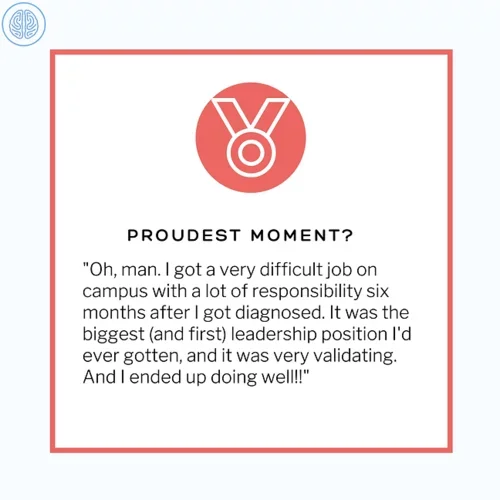Peer Mentoring
Peer Mentoring
Being a UCLA student is exciting but it can definitely get overwhelming from time to time. We get that, and we are here to help! Our peer mentorship program is an expansion of our mission: to provide an inclusive space for students with Autism, ADHD, and other learning differences. The program is geared toward helping neurodiverse students with anything that they may need. Whether it be time management, emotional support, goal setting or more, our mentors are trained to empower students to achieve personal, academic, and professional goals.
What Can All Brains Do for You?
- Weekly 1 on 1 meetings
- A Sensory-Friendly Learning Space
- Support in Navigating UCLA and Finding Resources

Apply to be a Mentee!
Looking for a mentor at UCLA? Apply for our peer mentorship program and get matched up!
For more information on the peer mentoring program, please contact us at peermentors@uclaallbrains.org
Apply Here!
Get to know our peer mentees!



The Peer Mentee wished to remain anonymous
"The executive dysfunction symptomatic of ADHD makes even taking care of the most basic needs impossible sometimes. There's a lot that goes into cooking a meal, for example. First, I never know what first step to take, and my brain doesn't want to focus enough to figure it out. Then maybe I do start cooking, but I quickly get distracted and wander off with the water boiling on the stove. So now it's been an hour and I've burned the water, my roommates have taken over the kitchen, and I'm even more forgetful, confused and difficult to motivate because I haven't eaten.
That's the Catch-22 of ADHD, and of a lot of disorders and chronic illnesses that make fulfilling basic needs harder. Lack of meds, sleep, food, water, exercise, or caffeine (for the caffeine addicts) will cause a level of executive dysfunction in anybody. But people with executive dysfunction are already operating on a lower level. For me, missing sleep, or food, or exercise, etc. can be debilitating, or near it. When I'm at my best, it's because I'm following a set of morning, afternoon and nighttime routines—because habits and ADHD live in different parts of the brain!— that I spent hours researching and consciously outlining. But anything, including an assignment that made me stay up late, or an argument with a friend (or a global pandemic HAH) can topple the system and send me back to the "what's school? who am I??" territory, so I'm always living on the edge.”